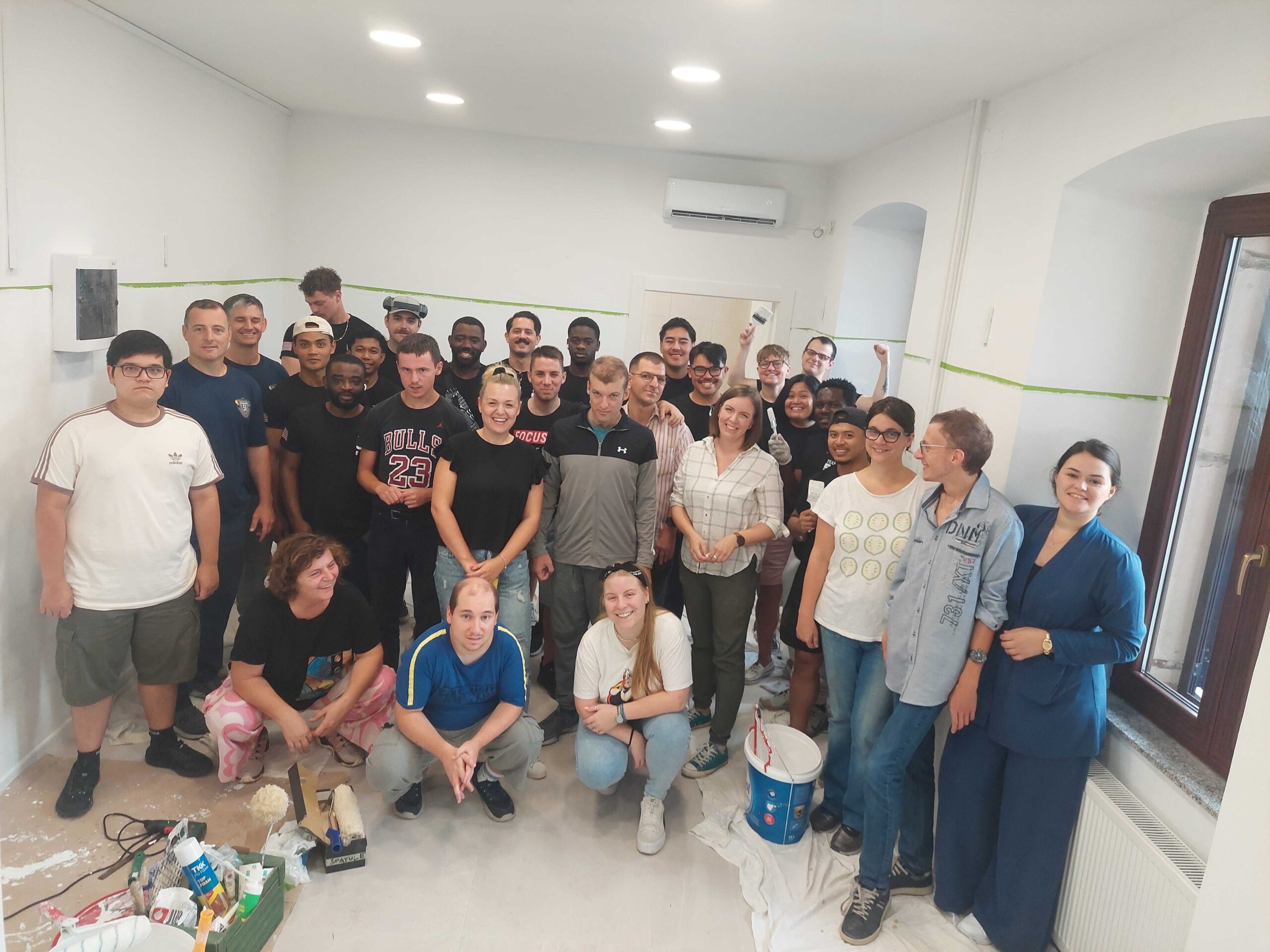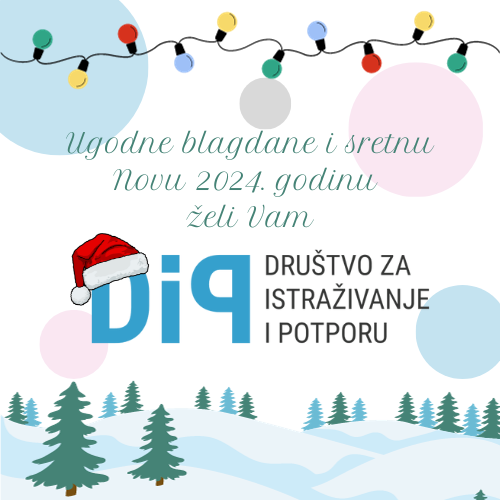CALL TO CELEBRATE WORLD AUTISM AWARENESS DAY
IN THE DIP, TOGETHER WITH THE HILTON HOTEL, RIJEKA
https://www.hilton.com/en/hotels/rjkochi-hilton-rijeka-costabella-beach-resort-and-spa/
Are we ready to include those who are “different”?
We invite you to mark World Autism Awareness Day with your presence and with an announcement, at the Research and Support Society, Wenzelova 2, Rijeka, on Monday, April 3rd, 2023, at 12:00 p.m.
We will be joined and supported by the Hilton Hotel Costabella, Rijeka, whose representatives, the general manager, Ryan Gauci, and the head of human resources, Nataša Kovačić Stilinović, will visit the DIP and our members. They will treat us with cakes made in the Hotel, in order to give their contribution and support to our work. We started cooperation with the Hilton Hotel in 2022, and the basis of our cooperation is common goals, aligned with the UN’s global goals of sustainable development. The Hilton Hotel develops the working and cultural habits and atmosphere of a socially responsible company, supports the local community, uses the services of small and medium-sized companies from the local community, employs people with disabilities, cares for a culture of respect for diversity among employees, but also for the environment (https://esg.hilton.com/toward2030 /). Our business cooperation is developing in several directions, precisely because of their mission and business culture. This joint celebration of World Autism Awareness Day is just one part of our mutual new story, which we are building for our members and the community in which we live.
World Autism Awareness Day has been celebrated since April 2nd, 2008, when this day was included in the calendar of World Days of the United Nations. By marking this day, the UN General Assembly wants to draw the attention of the public around the world to the increasing challenges faced by people with this complex disorder. According to a series of studies, people with autism and their families are a particularly vulnerable part of the population, which requires systematic solutions and constant support and care from the community in which they live.
According to data from the Croatian Institute of Public Health, 266 people with autism spectrum disorder (ASD) have been diagnosed and/or registered (HZJZ, 2021) in the Primorsko-goranska County. Among them, the majority are aged 0 to 19. This means that in the last 20 years or so, this diagnosis has been taken more seriously, because “autism” does not disappear with age. People either learn how to live in their environment and the environment “learns” how to live with them; or, on the other hand, they are not provided with equal opportunities, so some other, secondary disorders or diagnoses are on the forefront, which arose as a result of inappropriate care and adaptation of the environment . Croatia, and thus also the Primorsko-goranska County, still do not have an “Early Intervention Center”, which is the most important in the further development of all children with developmental difficulties, including children with ASD. Autism is thought to occur in a ratio of 1 in 100 people. (NHS, UK National Autistic Society, https://www.autism.org.uk/advice-and-guidance/what-is-autism. There are certainly more of these persons in our County, because we meet this population every day; those who were not diagnosed with ASD in childhood.
Recently, there is more and more talk about “neurodiversity” and “neurotypical” people, in order to emphasize that we all have our own model of cognitive response to reality and others around us, which represents an inclusive model for diversity. Neurodiverse people are people from the autism spectrum, ADHD, dyslexia and dysgraphia, as well as people with intellectual or learning difficulties, etc. Although there are criticisms and objections, this model has erased the stigma of “disease” from autism, which creates new opportunities for support and care and for inclusion in the community.
Among other persons with disabilities or children with developmental difficulties, there are also people for whom this disorder is not a “primary diagnosis”, so it is assumed that there are many more such people who need support and care in order to develop their abilities. In the ten years of work of the DIP, we have often encountered the consequences of inappropriate care, as a result of the lack of diagnostics and thus, the lack of appropriate rehabilitation procedures. These are usually children or persons with combined difficulties, and they are the ones that require the greatest adjustments to the system most often stand out. Autism is often accompanied by ADHD, dyslexia, epilepsy and intellectual difficulties, as well as disorders such as anxiety and depression. In our work, we have met many young people who were not diagnosed with an autism spectrum disorder during schooling, so often during developmental changes changes in behavior occur, precisely because of an inappropriate form of schooling and an inappropriate social environment. Some people on the spectrum have learning difficulties, some don’t. The range of differences between people on the spectrum is large, that’s why it is common to say that they are “people on the autism spectrum”.
The challenges faced by children and people with ASD are visible at all levels of the system and in all developmental stages:
- Inappropriate and uneven diagnosis (there is no national center for autism), so some are and some are not registered in the system, which exemplifies inappropriate care and education.
- An insufficiently developed system of early intervention (although in PGŽ there are numerous associations that work intensively on early intervention, such as the Association for the Care of Autistic Persons, the Lighthouse Association and others).
- Inappropriate system of education lead, in schools that are not ready to adapt to inclusive education or in isolated institutions.
- Inadequate health care (impossibility to obtain care and often unavailable health care in an appropriate way). A major breakthrough was achieved by the Association of Autism Associations in Croatia (SUZAH) in cooperation with the Association for Autism Zagreb. An agreement was reached with the Ministry of Health on the introduction of the Protocol for the admission and medical treatment of persons with autism –http://www.autizam-suzah.hr/wp-content/uploads/2023/02/Upute-za-postupanje-PSA-medicinske-ustanove-4.pdf
- Few opportunities for care and support after leaving the education system exist, although, if they are provided with adequate support, people from this spectrum can be good workers and valuable members of our society.
The DIP also organized a half-day stay and psychosocial support social service for this group, because many young people and their families have been joining us since the foundation. Their health is deteriorating due to a lack of care and support and inclusion in the community. But they are not isolated in a separate group, but live, learn and enjoy life together with other disabled people with different difficulties, numerous volunteers and in the community, actively participating in structured activities. We support them and their families in solving everyday challenges, so that together they create opportunities for a community of equal opportunities.
Let’s be clear, often in the search for the causes and consequences of autism, as well as because of the impossibility of establishing an appropriate model of behavior, the solution is sought in the person, and not in the environment. Incorrect and wrong beliefs about people on the autism spectrum develop, which often leads to prejudice, to dangerous interventions or to those interventions that lead to stagnation, impairment of health and the impossibility of a person’s development:
- Autism is not a disease, people on the autism spectrum see the world around them in a different way and it is up to us to find ways to reach them. It manifests itself in difficulties in social interactions and communication and in “unusual” behavior for those who are not on the spectrum. We cannot cure autism; we can only find ways to pave the communication path to their world. People with autism are often said to be “in their own world”. They live in the same world as everyone else, they just experience it in a different way. If society does not accept them, it is no wonder that they end up being isolated. If you approach them in an inappropriate way, it is impossible to enter their world.
- Society and the system most often isolate them, prevent them from socializing with their peers, limits their stay in regular kindergarten or school programs, or exposes them too much to unfavorable environmental influences. Children and young people with autism need to be with their peers in order to learn social skills and for the environment to adapt to them, but in such conditions where the environment can adapt to them.
- You can often get the impression that they are aggressive, but that is just their response to the environment; they are not any more aggressive than others.
- They can often come across as cold and emotionless, but that’s not the case at all; they show emotions towards close people, as well as in a favorable environment for them. A favorable environment does not mean being shielded from the outside world and in complete isolation, but in an environment that understands their ways of communication.
- Being a person on the spectrum does not mean that these people cannot have friends and live a quality life.
- The NHS, according to scientific research, clearly instructs the public that:
- the cause of autism is not bad in parenting, vaccines, dietary habits, and that autism is not contagious. https://www.nhs.uk/conditions/autism/what-is-autism/
At the end of the day, like all other people, people on the autism spectrum need company, they need friends, people who will love them; they only need it to be done in a slightly different way.
Are we ready to include those who are “different”?
Marta Berčić, President of the DIP
Contact: [email protected], 0915580920








